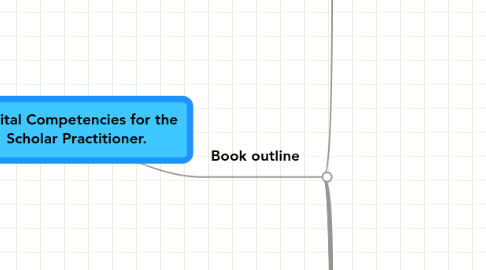
1. Book outline
1.1. Chapter 1-Introduction
1.1.1. Who is this book for?
1.1.1.1. Scholar Practitioner
1.1.1.1.1. Fielding Model
1.1.1.1.2. New skill set theory and practice
1.1.1.1.3. action and applied research skills
1.1.1.1.4. Public intellectuals
1.1.1.1.5. Connection between intellectual and practical pursuits. deWaal, E. (2011, March 13). Edmund de Waal: The classroom versus the workshop - By Edmund de Waal - Slate Magazine. Retrieved from http://www.slate.com/id/2288159/?from=rss
1.1.2. Digital Competence for Leadership and Change
1.1.2.1. Educators preparing people for 21st C
1.1.2.1.1. Digital frameworks Literacy
1.1.2.2. Critical Pedagogy
1.1.2.2.1. Transfomation, emancipation, liberation
1.1.2.3. Survival in a digital world
1.1.2.3.1. Blurring of lines
1.1.2.3.2. Exploitation-Astroturfing.
1.1.2.3.3. Culture jamming
1.1.2.3.4. New node
1.1.2.3.5. Captology: Persuasive Technology
1.1.2.3.6. Digital Politics
1.1.2.3.7. Digital Citizenship Continuum
1.1.2.4. More than literacy, more than competence, expertise is required.
1.1.2.5. Competence
1.1.2.5.1. 4 Stages
1.1.2.5.2. Incompetence
1.1.2.6. Digital Ecologies
1.1.2.6.1. Digital ecosystems
1.1.2.6.2. Knowledge ecologies
1.1.3. More than tech skills
1.1.3.1. But you need the skills to acquire the competencies
1.1.3.2. More than email, Docs and PPT
1.1.3.3. IT from the Steam age to teleports/holograms
1.1.3.4. No longer need specialized skills or instructional designers
1.1.3.5. Web 1.0, 2.0, 3.0
1.1.3.5.1. Ubiquitously Connected and Persistently Proximal (UCPP)
1.1.3.5.2. Permanent beta
1.1.4. Not just for e-learning
1.1.4.1. new forms of formal education
1.1.4.2. More than old wine in new skins.
1.1.4.3. all education relies on ICT
1.1.4.4. New way of being in the world
1.1.5. Collective Intelligence
1.1.5.1. cognitive surplus
1.1.5.2. Making the world a better place
1.1.5.3. Participation in community
1.1.5.4. Network society
1.1.6. Changes to the education business model
1.1.6.1. Control
1.1.6.2. Influence erroding
1.1.6.3. Changes to tenure
1.1.6.4. Erosion of Public education system-Private/For profit/charter school/proprietary can do the old business better. Need a new understanding of what it means to be education and cognitively competent.
1.1.6.5. Extended brain/ubiquitous computing/don't need to know what or how/ more important to know why
1.1.6.6. New economic models
1.1.6.6.1. What's a Wuffie
1.1.6.6.2. Flattr Micropayments Systems
1.1.6.7. Education in a world that is UCPP
1.1.7. Summary
1.1.7.1. Change is the only constant
1.1.7.2. Tolerance for change is essential survival attitude
1.1.7.3. Scholar practitioners must lead
1.1.7.4. No matter what it is going to require digital competence
1.2. Chapter 2- Basics
1.2.1. Tools
1.2.2. Skills
1.2.3. Aptitudes
1.2.3.1. Motivation/flow
1.2.3.2. Good enough
1.2.4. Networks
1.2.5. Systems
1.2.5.1. Desktop/Server/Cloud
1.2.6. FOSS/Proprietary Applications/Walled Gardens
1.3. Chapter 3- Digital Pedagogy
1.3.1. MIT model
1.3.2. YouTubeUniversit/ITunes U.
1.3.3. Social constructionism
1.3.3.1. Computer supported Collaborative learning
1.3.4. Connectivism
1.3.4.1. MOOC
1.4. Chapter 4- Education
1.4.1. Digital Skills for Online Education
1.4.1.1. As a learner
1.4.1.1.1. Learning to learn
1.4.1.2. As a teacher
1.4.1.2.1. Teaching to learn
1.4.2. Digital Skills for Place-based education
1.4.3. Developing Curriculum of r Digital competency
1.4.4. IT Admin tension
1.4.4.1. Cloud or utility computing may resolve.
1.5. Chapter 5- Graduate Studies
1.5.1. Study while working
1.5.2. Access
1.5.3. Keeping your distance
1.6. Chapter 6- Digital Competencies for Research
1.6.1. Online Communities of Practice
1.6.1.1. SAGE MethodSpace
1.6.2. What methodologies are appropriate?
1.6.3. Conducting research in online enviroments
1.6.3.1. Do you need an IRB for Second Life research?
1.7. Chapter 7- Scholarly Electronic Publishing
1.7.1. Wiki way
1.7.2. 9 Important Trends
1.7.3. Scholarly Communication Institute
1.7.4. Acts of Digital Scholarship
1.7.4.1. Zotero
1.8. Chapter 8- Openness to Emergence, Convergence and Change
1.9. Chapter 9- Digital Humanities
1.9.1. Definitions
1.10. Chapter 10-Becoming Virtual
1.10.1. Harraway Cyborg
1.10.1.1. Cyborg Anthropology
1.10.2. Digital Identity
1.10.2.1. Different from meat space
1.10.3. Seen your money lately?
1.10.4. Living in a hologram
1.10.5. Online Conferences- is it the learning or the shopping?
1.10.6. Augmented Reality
1.11. Chapter 11 - Need for Study
1.11.1. Emergence of new pardigms
